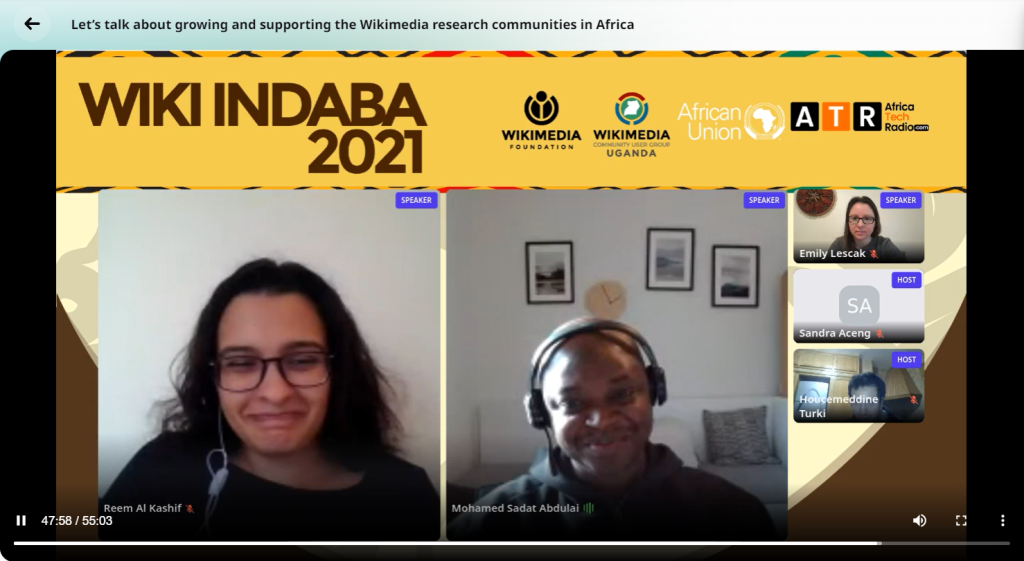
In this post, we share our learnings from organizing and leading a panel discussion held at Wiki Indaba in November 2021 focused on growing and supporting Wikimedia research across Africa. The discussion was moderated by the senior research community officer from the Wikimedia Foundation and the panelists were three researchers with ties to the Wikimedia community in Africa. The researchers shared their motivations for getting involved in research, the tools and resources that helped them get started, and advice for connecting researchers with their local communities.
The goal of this event was to open a conversation with members of the Indaba community about research needs and questions and provide resources and entry points for individuals interested in getting involved in research. Understanding the community’s goals and unmet needs helps the WMF Research team to work toward our goal of growing and nurturing a sustainable global network of researchers. The result was a vibrant conversation about the researchers’ motivations, their communities’ research needs, and resources that were helpful to them when they were starting out.
Our primary learning from organizing and leading this session was to be prepared! We met in advance to gather the questions we wanted to cover and organized them on our Etherpad. We also discussed potential scenarios and how we would respond to them. For example, if we have a large crowd, how will we make sure everyone is able to contribute? How do we address questions that the attendees are most interested in? And, what do we do if none of the attendees speak up? We also learned the importance of being flexible. While we had originally planned for an active discussion with attendees, we were prepared to shift to a panel discussion and able to use our Etherpad to prioritize the questions we wanted to focus on while the session was underway. In the future, we would also create a slide deck to archive on Commons to share information and resources, rather than only including them on the Etherpad.
Here are the main takeaways from the discussion. We invite you to read through our Etherpad and/or watch the recording to learn more. At the end of the post, we have listed additional resources and ways to connect.
What motivates your interest in research?
The Wikimedia projects provide a wealth of free, openly available data on a wide variety of topics. In particular, live statistics on readership and editing can be used to study behavior or users across the African continent. Not a lot is known about editor retention in African communities. It is important to understand their contributions so that they can have a bigger impact. Researchers benefit from an open community where they can access tools, cloud storage, and technical support.
What are the research needs in your communities?
Specific research needs vary by country, region, and language edition, but here are some common themes:
- Communities need capacity building support and research funding. Many research communities do not know about the WMF Research team and Community Resources. The roles of these teams in supporting researchers needs to be more widely disseminated.
- Communities need to understand the value of research, what type of work will be done, and how they can benefit from Wikimedia projects.
- There need to be more pathways and opportunities to help researchers get started. Technical documentation and skill building (e.g., in Python, JavaScript, HTML) would help researchers build proficiency. Researchers would also benefit from support in fund management, communication, and community management.
- Researchers need to hear from communities about what their open questions are and to find collaborators, particularly in their local affiliate groups.
How can community members get involved in research?
Let’s get rid of expert culture! Wikimedians need to be introduced to existing tools and taught how to use them. Communities should be guided in good practices for writing up their work. It should be a common practice for researchers to explore issues in their communities to help members make data-driven decisions.
What is the role of the Wikimedia Foundation in growing and nurturing the research community in Africa?
One of the Wikimedia Foundation Research team’s programs focuses on conducting foundational work. This involves strengthening social and technological infrastructure as well as advocating for the needs of Wikimedia researchers to support the global research community. A vital aspect of this work is growing capacities across the movement to increase the diversity of research questions and projects and connect researchers with their local and global communities. To do this, we are increasing professional support for researchers through a variety of means: co-organizing the Wikimedia Research Fund and Wiki Workshop, organizing Monthly Research Showcases and Office Hours, mentoring through Outreachy internships, and more. We are in the process of developing a strategy with members of the research community to further support researchers and grow and diversify the Wikimedia research network. We will post it on Meta early this year for public feedback and to advertise how to get involved.
Links to helpful resources
- Research mailing list
- Wikidata queries
- Research newsletter
- Research report
- Conferences
- Research showcase
- Research office hours
- Telegram
Stay in touch!
Connect with the WMF Research team at an event (https://research.wikimedia.org/events.html) or send us a message (https://research.wikimedia.org/contact.html)!
Contact Wikimedia Research Communities in Africa:
Data Engineering and Semantics Research Unit, University of Sfax, Tunisia:
E-mail: mohamed.benaouicha@fss.usf.tn, mohamedali.hajtaieb@fss.usf.tn, turkiabdelwaheb@hotmail.fr
Twitter: @Csisc1994, @DES_Unit
Interested in contributing to the newsletter? Contact mohammed.sadat.abdulai@gmail.com.
Connect with the authors:
Houcemeddine Turki, University of Sfax and Wikimedia Tunisia (turkiabdelwaheb@hotmail.fr, Twitter: @csisc1994)
Reem Al-Kashif, Ain Shams University and Wikimedia Egypt (reemalkashif@gmail.com)
Mohammed Sadat Abdulai, Wikimedia Deutschland (mohammed.sadat.abdulai@gmail.com, Twitter: @masssly)
Emily Lescak, Wikimedia Foundation (elescak@wikimedia.org, Twitter: @elescak)

Can you help us translate this article?
In order for this article to reach as many people as possible we would like your help. Can you translate this article to get the message out?
Start translation